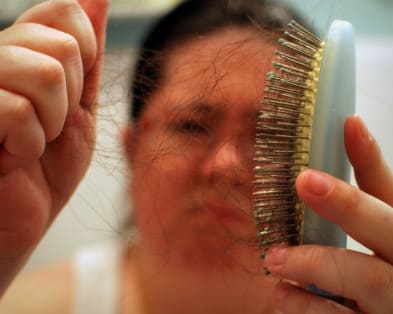8 Things Never To Say To A Cancer Patient
Shopify API
 Image via Flickr with modifications
Image via Flickr with modificationsCancer. It sucks. Maybe the only thing more devastating than receiving your diagnosis is having to tell your friends and family members, and bracing yourself for all of the well-meaning, yet totally hurtful things they are going to say. Ok, maybe it's not worse than your diagnosis, but it sure isn't fun, and it definitely isn't encouraging. Most of the people in our lives have the best intentions, and yet when it comes right down to it, they don't know how to react, or how to be helpful. This list is a good place to start.
8. My cousin's neighbor's sister had breast cancer...
 Image via Flickr
Image via Flickr
Every diagnosis is different, every patient reacts to treatment differently, and bottom line, what they are going through is not the same as anyone else you know that has cancer. Take time to ask thoughtful questions about where they are at as far as processing their diagnosis, and then actually listen to their answers.
Instead: Focus on what this individual is going through.
7. Are you going to lose your hair?
 Image via Flickr
Image via Flickr
Not only is this comment extremely personal and rude, it hits at a core issue lots of women going through treatment face: the fear of losing their femininity. Instead of shining an intrusive spotlight on this topic, try giving out compliments! And better yet, offer to go shopping and try on some new styles to fit the new look!
Instead: Give compliments! Offer to try out new styles/hats/wraps/makeup!
6. Do you think it was caused by weight gain/too much soy/not going organic?

There is already so much self-blame and guilt when it comes to cancer diagnosis, that trying to pin point the cause of it is really not helpful. They have already battled (and are still battling) the demons of shame and "what if" in their life, and the truth is, there are so many variables, we may never know what causes cancer. Either way, it's not a productive conversation. What helps is what their diet is now, and how you can help make healthy living simple for them.
Instead: Focus on how to help them live the healthiest life they can right now.
5. You don't look sick
 Image via Flickr
Image via Flickr
I've never understood why this seems to be a common reaction. Do you think your friend waited to tell you they had cancer till two months into chemo? Or on their deathbed? Chances are, they recently found out. Maybe this is meant to be a compliment, in that "you sure don't look like your body is attacking itself." Either way, not helpful. Instead, ask how they are feeling today, and be open to a conversation about what they are experiencing.
Instead: Be open to discussing what they are going through.
4. Everything will be ok, and other platitudes
 Image via Flickr
Image via Flickr
I know you mean well, and it's difficult to know what exactly to say to a loved one who has just received devastating news, but reciting trite phrases, or writing off their pain as something that will only make them stronger is actually hurtful. Yeah, maybe there is a bigger plan, and they will be a better person after the battle is over, but right now it sucks. And you need to be ok sitting with your friend in this space, where the struggle is real, and the fear is palpable. Get to know what exactly they are afraid of, and offer genuine encouragement, tailored to this person, in this place, at this time.
Instead: Listen to the struggle, offer real, genuine, individualized hope, not recited lines
3. Let me know how I can help
 Image via Flickr
Image via Flickr
Don't get me wrong, offering to help is such a blessing during this time of need, and adjusting to a new normal, but phrasing it this way puts the ball in their court, and adds pressure for them to try and find something for you to help out with. As my mother put it when she was first diagnosed, "I don't know what I need until I need it!" Instead, it is much more helpful to pick something and do it. Do they need to eat on Tuesday night? Perfect, you can cook a meal. Are you headed out to do errands? Great, you can call your friend and ask if you can pick anything up while you're out.
Instead: Offer to bring over dinner, or call when you are at the grocery store and ask if there is anything you can pick up
2. I haven't heard from you in a while
 Image via Flickr
Image via Flickr
When your loved one has gone public with their diagnosis, several things happen pretty quickly. One thing is that EVERYONE wants an update and they want it NOW. It is overwhelming. Not to mention, sometimes they just don't want to talk about the big "C" word. Sometimes they want to shoot the breeze about movies, or catch up on office gossip. So, if you've noticed you're loved one has been out of communication for a while, offer to field some of the calls and e-mails. When my mother was going in for brain surgery, my brother and I each had a list of people to call/e-mail/facebook every few hours. And when it was over, it was our job to inform them that we were going to be unreachable for the rest of the day, and to please not bother us. Everyone needs someone to keep the masses at bay.
Instead: Offer to be a point person for communication in their life
1. Nothing at all
 Image via Flickr
Image via Flickr
The last thing I want this list to do is silence friends and family. Your loved one needs all the support they can get right now! There is nothing you can say, as long as it comes from a place of understanding and genuine love, that is worse than just dropping out of their life. Sure, things might be awkward, and life is definitely going to change, but you can be a source of strength and encouragement. It is such an honor to be part of the team rooting for my mother's recovery. So, go ahead, jump right in!
Instead: Listen! Be a positive presence!
